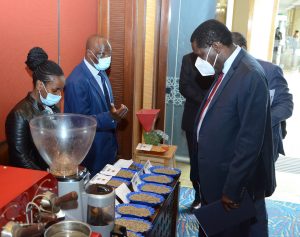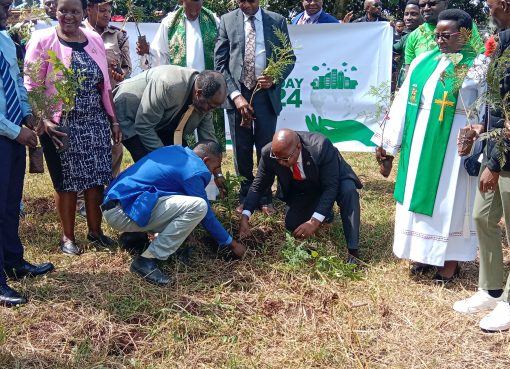Kenya’s Arabica Coffee variety has continued to attract buyers from the best export markets of the world and fetch premium prices despite the reduction in coffee production in the country.
Agriculture Cabinet Secretary Peter Munya today said that in the 2019/20 coffee year, the Country exported 46,333 metric tons of Green Bean Equivalent that earned sh.22 billion.
The CS who was today launching the Coffee report 2021 in Nairobi added that this was a 285 percent increase in coffee export earnings from sh.5.7billion realized in the 2003/04 coffee year.
Acreage under coffee production has decreased by over 30 percent from about 170,000 hectares in early 1990s to about 119,000 hectares currently, coffee production has also decreased by a whopping 70 percent from a peak of 129,000 metric tons in 1983/84 coffee year to about 40,000 metric tons currently.
While Kenyan coffee continue to fetch top dollars in the market, the payments to coffee farmers per kilogram of cherry have continued to decline,” he said.

The new report, ‘National Coffee Revitalization progress report’ Munya said seeks to identify the root cause for the apparent asymmetry between the high earnings of Kenya’s Arabica coffee and the low prices paid to farmers by evaluating the respective roles of the coffee societies, commercial millers, marketing agents, coffee auction and coffee buyers in this respect.
“This Coffee Report 2021, is another milestone towards concretizing the on-going reforms in the coffee sector in the country that are aimed at improving efficiency in the performance of the sector and earnings to coffee farmers,” the CS said.
Munya however acknowledged that the good performance of the coffee sector began to deteriorate in the mid-1990s mainly due to poor governance, bad management and corruption that permeated the entire coffee value chain.
As a consequence, he said that farmers’ assets held in trust by the societies, Unions and former KPCU were stripped while delays or non-payment of coffee dues to farmers for coffees already sold became a common occurrence.
“Vested commercial interests, the grossly ineffective coffee auction to nurture effective competition and efficient price discovery and corruption and inefficiency at the coffee cooperative societies have collectively contributed to low and declining coffee earnings by farmers, low household incomes in coffee growing counties and consistently decreasing coffee production,” the CS noted.
It is in the context of the governance weaknesses and operational inefficiencies in the coffee value chain, Munya added, that the administrative, policy and legal reforms in the coffee sector have been mooted.
The administrative coffee sector reforms will revolve around revival of New KPCU after liquidation of the old KPCU that was in receivership, capitalization of New KPCU with Ksh.3 billion Cherry Advance for coffee farmers, take-over and operationalization of Meru and Sagana Coffee Milling Plants and inculcation of transparency and accountability in all milling processes at New KPCU plants.
He further noted that the legal and regulatory coffee sector reforms are aimed at addressing governance challenges that plagued the sector with a view to giving coffee growers discretion in the processing, trading, sale and payments for their coffee as adopted in the Coffee Bill, 2020.
Munya explained that there are other progressive reforms contained in the Coffee Bill 2021 that are undergoing public participation by the National Assembly and urged all coffee farmers to mobilize their members of Parliament to support the Bill.
Vice Chairman of Senate Agriculture Committee, Catherine Waruguru said that parliament is ready and committed to support the coffee reforms.
Ag. CEO NKPCU Timothy Mirugi said that they have so far disbursed the new Cherry Fund to a tune of Sh 50 million which he acknowledged is still minimal and urged farmers not to resist the fund.
In the next three years, the CEO projected that they will have disbursed the Sh 3 billion cherry fund, refurbish / operationalize all the assets and also be a milling and market service provider.
Coffee is currently grown on approximately 120,000 hectares spread across 33 counties supporting over 800,000 households and over 5 million citizens directly and indirectly. Over 70 percent of coffee has historically been grown around the Mt Kenya Counties of Kiambu, Murang’a, Nyeri, Kirinyaga, Embu, Tharaka Nithi and Meru while significant promise exists in the new coffee growing frontiers in Rift Valley, Western Kenya and Nyanza.
By Wangari Ndirangu





